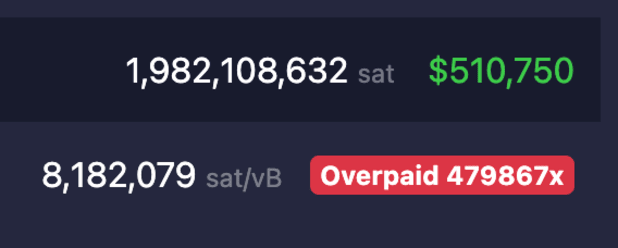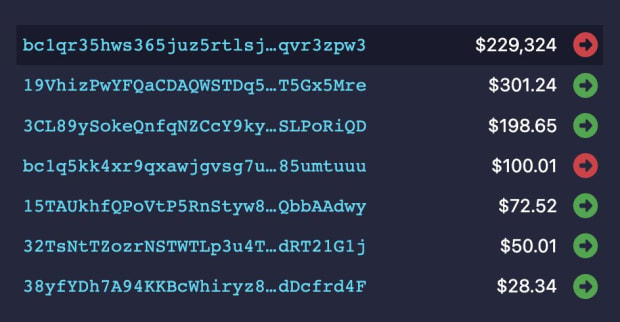
UPDATE, 1:35pm, 9/13/2023 – A PayPal spokesperson says its infrastructure partner Paxos was responsible for the overpayment: “Paxos overpaid the BTC network fee on Sept. 10, 2023. This only impacted Paxos corporate operations. Paxos clients and end users have not been affected and all customer funds are safe. This was due to a bug on a single transfer and it has been fixed. Paxos is in contact with the miner to recoup the funds.”
In a surprising turn of events, PayPal, the global online payments giant, reportedly overpaid a staggering $510,750 on a Bitcoin transaction fee. The incident, initially thought to be a “fat-fingered” mistake, has now been traced back to an issue within PayPal’s processing system, according to a report by Mempool’s Mononautical. This is the largest fee ever paid for a Bitcoin transaction in dollar terms.
Image Source
The investigation into the colossal overpayment, which drew widespread attention when it was first reported, has led to some unexpected discoveries. The overpaid fee was sent from a hot wallet using the address “bc1qr3…zpw3,” which commenced operations in June earlier this year. On-chain activity associated with this address indicates automated processing of fiat-denominated withdrawals, closely resembling the behavior of an inactive wallet labeled as PayPal on oxt.me, specifically “bc1qhs…kx4n.” The Bitcoin transaction fees are typically determined by market demand and network congestion. They can vary significantly, but a fee exceeding $500,000 for such a small transaction is considered highly unusual.

Image Source
The transition from the old wallet to the new “bc1qr3…zpw3” wallet can be distinctly observed on-chain through an intermediate address, “bc1qlm…yvaf,” adding further evidence to the software bug theory.
To confirm this finding, actual known PayPal withdrawals were traced on-chain, ultimately leading to the conclusion that the issue likely originated from within PayPal’s management system. “All evidence now points to a software bug like this as the cause of the error,” Mononautical said. “I really feel for the developer who wrote that code – it’s such an easy mistake to make, and it should have been caught in review.”
Furthermore, the entire system was running “completely unmonitored,” as PayPal failed to notice or halt the erroneous withdrawals for nearly 24 hours. This incidenct serves as a stark reminder of the need for meticulous attention to detail and vigilant oversight when conducting Bitcoin transactions, especially when handling large sums of money.

Leave a Reply